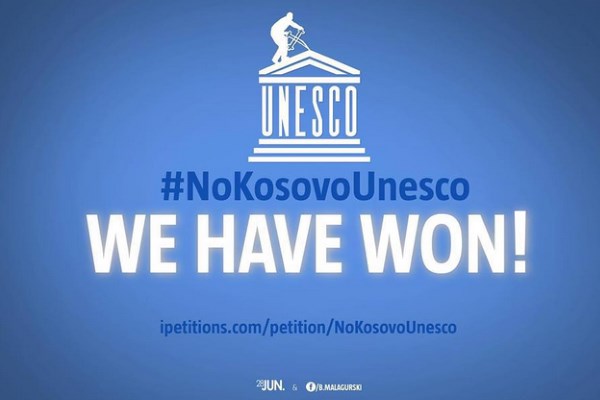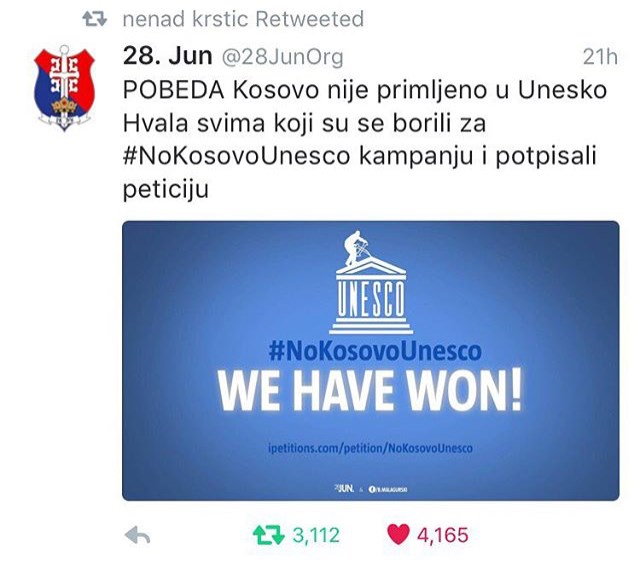The truth about #NoKosovoUnesco

After my previous article about in which I expressed doubt as to who is really behind it, one of organizers and co-founder of 28. June – Filip Filipi – contacted me, wanting to do an exclusive interview regarding the campaign.
From this interview, you’ll learn the truth about #NoKosovoUnesco and all the details about the real initiators and participants of this successful action, as well as details on the contribution and support of the Serbian government. Filip asured me that the action wasn’t initiated by the Government and for all other details read the interview bellow.
1. Tell us something more about yourself, what you do and how did you end up in Canada?
I’m the Director of Special Projects for Grapevine Global which is a division of Direct Focus Online – a digital marketing company with offices around the world. I’m also the President and Founder of 28. Jun and before that I was in the music industry. Because 28. Jun works a lot with the Serbian diaspora for the past 5 years I’ve been living between the major population centers which are Toronto, Chicago, New York and Vancouver, where I’m from.
2. For those who still don’t know, tell us more about organization 28. June.
28. Jun is a multinational organization engaged in humanitarian, social and philanthropic functions. The reason we are somewhat unknown in Serbia is because we have been strategically boycotted by the Serbian media because we tend to focus on Serbian interests and help Serbs throughout the Balkan region which seems to be taboo in the current political climate. We were founded in 2011 and registered as a Canadian Not-for-profit in 2012, to date we have delivered 170 tons of humanitarian, medical and disaster relief aid worth over $4.4 mil to the Western Balkans. We are partnered with the Red Cross, UN and Serbian Orthodox Church and have received material and financial donations from American, Canadian, German and Austrian corporations, Christian charities and Israeli advocacy groups but we also work with Islamic organizations on the Syrian refugee crisis. However I must emphasize we operate completely independently and pursue our own agenda. We have about 350 core members around the world, our social media and mailing list reach is about 300,000 and we’ve done events in over 120 cities across 30 countries. Our average member age is 25 but we have an advisory board of older members and the minimum education required to be on the board is a Masters degree. We’ve donated to and supported every other major Serbian humanitarian organization from Novak Djokovic to Vlade Divac.
3. How did you come up with the idea for #NoKosovoUnesco and who are the creators of the campaign?
I’m glad you asked! On October 17th I contacted our partner Boris Malagurski and the next day we launched the #NoKosovoUnesco petition, as is very well documented in the media the petition reached 100,000 signatures within 72 hours and our members in France submitted a physical letter with the petition directly to Irina Bokova, Director-General of UNESCO in Paris. The reason I thought of a petition is because I ran a similar project for my company 2 months earlier for Cecil the lion. Sometimes special permission is given to export the emails of everyone who signs a petition so that audience can later be updated on developments and asked to help spread other related information such as videos. Importing 100,000 new emails is not something everyone can do because it is considered spam but because I was one of the first customers of Fanbridge, which is a platform for musicians to stay in touch with their fans, they trust me with importing whatever I want because they know it’s targeted and not spam. We then used this mailing list and our existing social media to share updates in support of the #NoKosovoUnesco campaign which included our viral video with General MacKenzie and instructions on how to contact diplomats of other countries who will be voting. We also provided material and financial support to our partner student organizations in Serbia like Students for Truth and Sistem Vrednosti who held protests in Belgrade, Kragujevac and Kosovska Mitrovica.

4. Was the Ministry of Foreign Affairs where you work now as a Digital Media Consultant, or any other ministry/state institution involved in the campaign from the beginning?
That is a very important question and this is how that went. A day after the petition was launched I called Prime Minister Vučić who was in Moscow at the time. Bless his heart, when he saw it was a foreign number he picked up right away and we briefly chatted, he told me he was about to go into a meeting with Putin and he’d contact me in a few days but that I should contact Dacic. I called Dačić and in typical Kosovar fashion he didn’t pick up but I texted him and to his credit his aide contacted me within 3 hours. I have nothing but praise for Vučić and Dačić because it was the fastest turnaround time high level officials ever responded to us. They thanked 28. Jun on TV for our efforts and as someone whose family is from Kosovo I want to thank them for putting so much effort into this and I’m extremely proud we achieved this. Likewise, we were in contact with Darko Tanasković, Serbian ambassador to UNESCO, who worked extremely hard on this and even though he did not want to be mentioned I want to credit Vuk Jeremić with providing us with useful contacts.
5. What was the role of Serbian government in this campaign?
One organ of the government I am very unhappy with is the office of the presidency and Nikolić’s aide Simo Čulić in particular. They joined the #NoKosovoUnesco campaign 3 days before it was over, put together an unprofessional video and did a few tweets and are now attempting to take credit for the entire thing. They forced us to include their logo in our viral video with MacKenzie but now that we’re putting everything out in the open they had nothing at all to do with it. I am not attacking President Nikolic directly, who I met in New York and who I heard really cares about the issue of Kosovo but how his cabinet has attempted to hijack credit for this initiative is very insulting to myself and our members who took 3 weeks off from our jobs to focus on this.
6. Who and in what way has access to a database of over 150,000 email addresses that you’ve collected in the campaign?
Only 28. Jun and through the program called Fanbridge.
7. Were there any people and/or institutions that have attempted to profit during the campaign or afteh its great success?
Simo Čulić did an interview yesterday where he didn’t mention anyone but himself and and only after we contacted the author of the article were the right corrections made. It really seems some government officials in Serbia have mastered the art of not doing anything while being paid by taxpayers and then stealing credit of capable hard working people. This issue needs to be dealt with before Serbia can transition into a modern state. By his actions I can tell Simo has largely passed through life by stealing credit from people who can’t defend themselves and have no platform to speak against his parasite-like behaviour but I’m going to teach him a lesson on how to be a good human being and start earning his salary. The office of the diaspora under Slavka Drašković tried a similar tactic with us, and within 6 months she was fired and the entire scandal was exposed. Going against people driven by an unselfish ideology like 28. Jun is dangerous because we don’t respond to bribes or threats and have the capacity, connections, resources and will to severely retaliate when we are wronged.

8. Was the campaign over after Kosovo’s refusal of membership in Unesco or you have more plans in the near future?
Absolutely not! in the next month we will hold our first event in Belgrade with our partners Sistem vrednosti to support humanitarian projects in Kosovo and we will hold similar events on every continent around the world all before the new year. We will always stand by Serbs living in Kosovo i Metohija as well as Serbs living in Krajina, Republika Srpska, Crna Gora like we have done with our humanitarian projects over the past 5 years. We are at the disposal of the state and whenever the government needs our help to assist our country we will always try our best to do all we can!
I am sure that this interview will open many more questions, particularly because there are still articles that glorify the role of Office of the President – as this one from yesterday and I hope that Filip will be ready, if necessary, to further clarify everything.
This post is also available in: српски
